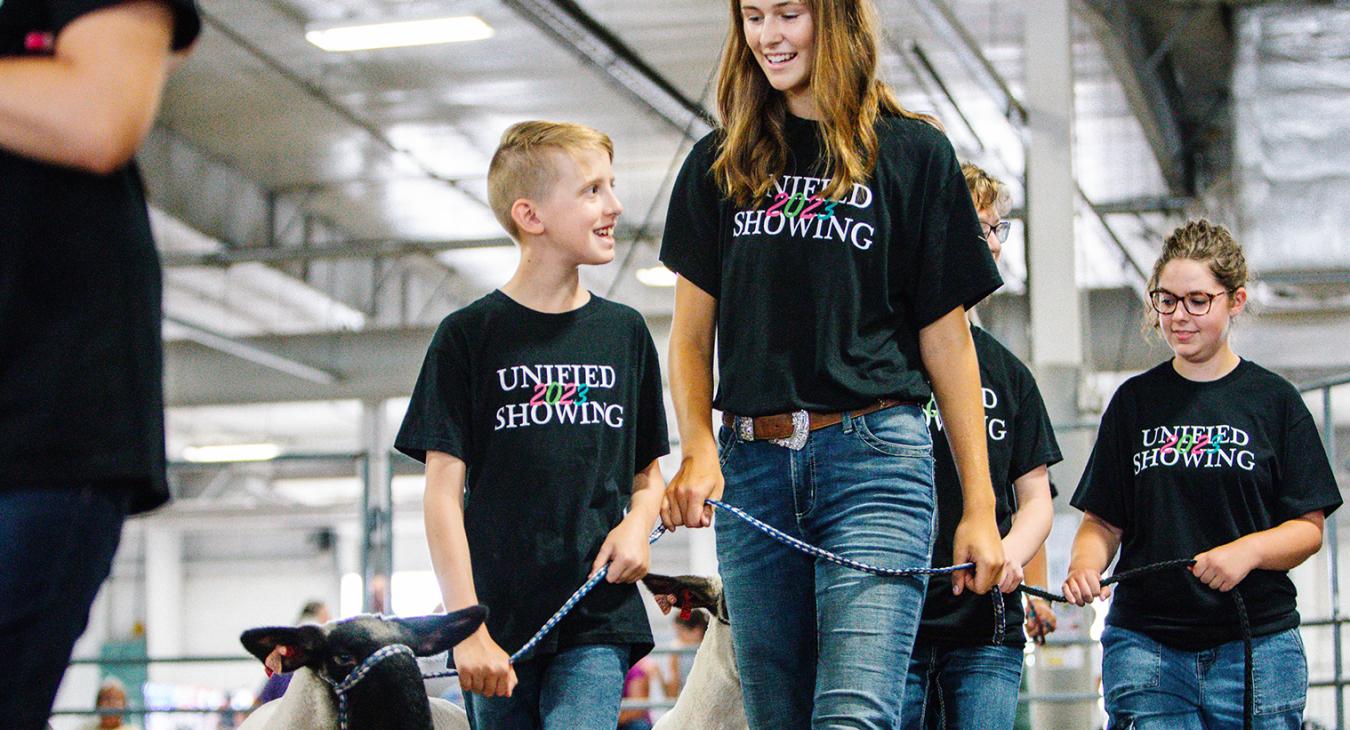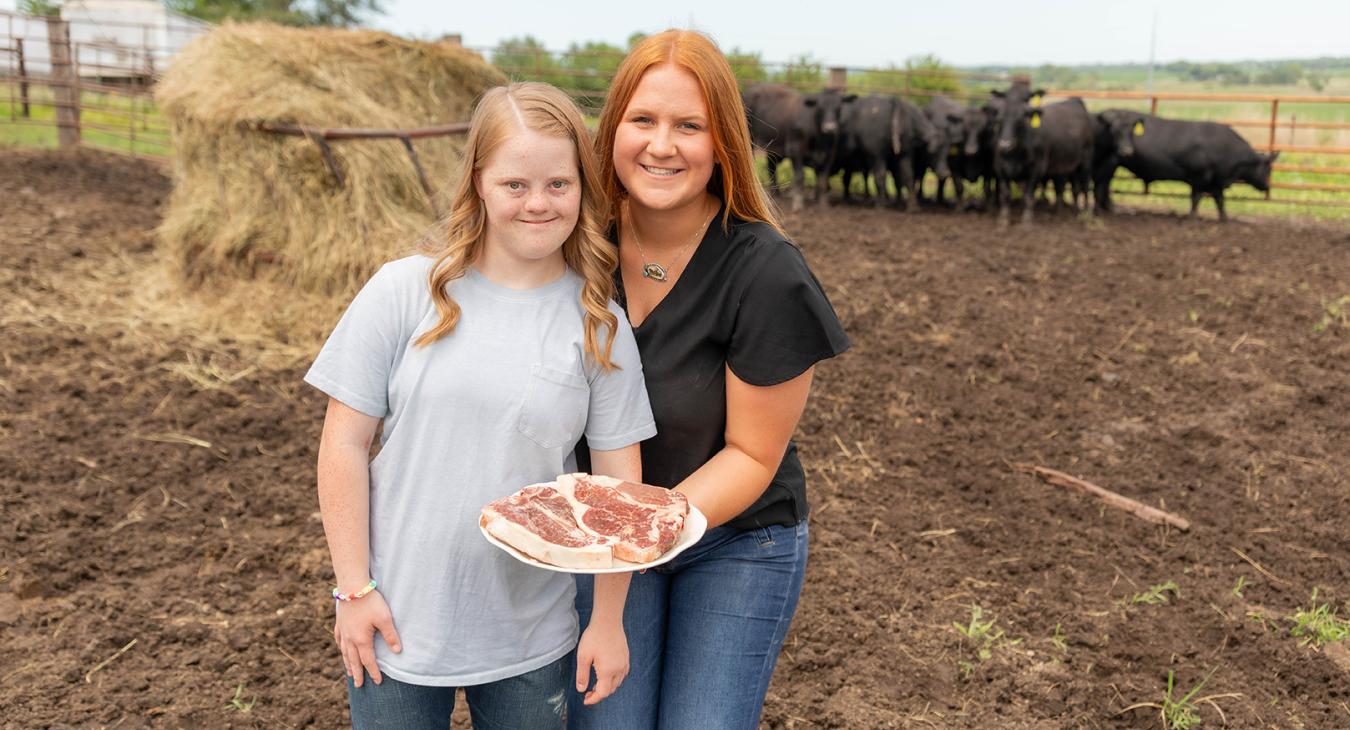By Geitner Simmons
In 2020, Allison Walbrecht, a 16-year-old student at Lincoln Southwest High School, had an innovative idea — one combining her love for agriculture with her desire to provide opportunities to children with disabilities.
But, she wondered, would it really work?
Her idea: create the Unified Showing 4-H Club. In it, a youth with a disability would pair with a teen helper in a “showman and buddy” partnership to develop skill in animal husbandry and ultimately participate in the 4-H livestock exhibition at the Lancaster County Fair.
She had her doubts.
“I was so scared they would hate it,” said Walbrecht, part of the fifth generation of a Lancaster County ranch family.
But then Josh Layman, one of the first club participants, arrived at her family’s ranch and dispelled her worries. Josh, who is autistic, ran straight to the lamb pen and plopped down excitedly in the middle of the creatures.
“The lambs came right up to him, and they ate right out of his hand,” said Walbrecht, now a sophomore animal science major at the University of Nebraska–Lincoln. “The lambs knew immediately that Josh had this love for them and for livestock. It was beyond anything I could ever describe.”
Josh became an enthusiastic member of the club, and in the years since, his experiences have demonstrated Unified Showing’s life-changing possibilities. He has steadily deepened his knowledge and developed into a first-class showman. This year at the Lancaster County Fair, he was asked to compete in the sheep show — and became the lightweight champion.
“It’s blossomed into an amazing thing,” said Calvin DeVries, the Nebraska Extension 4-H educator for Phelps and Gosper counties. He was the Lancaster County 4-H educator when Walbrecht began the club.
“Everybody's talking about it, everybody wants to do it,” he said. “I hope it can be something that grows into a statewide event in the soon to near future.”
Gage and Otoe counties, in addition to Lancaster, now have Unified Showing Clubs, and several counties, including Box Butte, have adopted the curriculum.
Unified Showing aims to send an important message about understanding others and expanding people’s opportunities, Walbrecht said.
“Youth getting agricultural experience and the skills that 4-H teaches them — there's no limit on how valuable that is,” she said.
Unified Showing has come to hold great meaning for Josh and his family, said his mother, Kristi.
“Allison, her mother, Denise, and the Unified Showing buddies have been such a blessing to Josh,” she said. “Watching him each summer with them and the sheep has brought Josh’s dad and I such joy. And we are so proud of him. Seeing him develop such a positive relationship with them and the sheep is heartwarming.”
Livestock events featuring Unified Showing members regularly produce a surge of audience attention as club members display their lambs, halt them and answer judges’ questions, DeVries said.
“The 20 minutes they have in the ring — that’s everything to those kids, to get to show their animal at the fair,” he said.
“If you were to compare attendance at every event on the livestock side that I've witnessed myself, I think the stands have been the fullest at the point when this is taking place,” DeVries said. “You can just see everybody in awe. If there’s one thing that stands out in conversations after the fair, I think it's always that Unified Showing.”
The club’s benefits also extend to the teen buddies.
“Some of the buddies are involved in agriculture and some of them have never seen a livestock animal before either,” Walbrecht said. “It’s incredible to see how they are able to grow as a person and be part of that. To see the relationship grow between a showman and a buddy is out of this world. A lot of times, they’ll go to school together, so it’s fun to hear about how they see each other in the halls or just how they grow in appreciation for what they have.”
The Unified Showing Club has been around long enough that some members are starting to age out — but Walbrecht is determined to keep the opportunities going for those teens. So, she has started her own business, Unified Agriculture, a direct-to-consumer beef-sales enterprise creating ag-focused employment opportunities for those with disabilities.
Claire Bruns, a Lincoln Southwest student who was one of the club’s first showmen, is the co-founder of Unified Agriculture, which currently has eight head of purebred Angus steers.
Many of the club’s showmen have developed a passion for livestock raising and care, and it’s important for the ag sector “to let them in the door,” Walbrecht said. “I think every reason why it's important to have anybody involved in agriculture are the exact reasons — times a thousand — why it’s important to have my kids involved.”
Long term, Walbrecht aims to maintain her Unified Showing and Unified Agriculture initiatives while pursuing a career in marketing for agriculture, to “tell the story” of the beef industry’s benefits for consumers.
Walbrecht’s central reward has been the opportunity to help showmen discover and display their talents, she said.
“But then to be able to say I have been blessed enough to be within an industry my entire life and be able to share that with people who might not have that opportunity — it's been the greatest joy of my entire life.”


